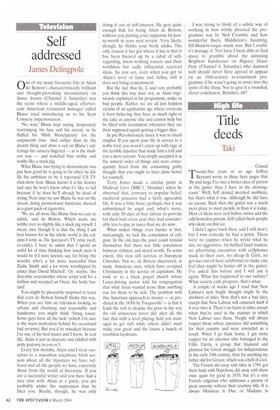Self addressed
James Delingpole
Qne of my many favourite bits in Alain de Botton's characteristically brilliant and thought-provoking documentary on Status Anxiety (Channel 4, Saturday) was the scene where a middle-aged, effervescent American restaurant manager called Blaise tried introducing us to his Sean Connery impersonation.
'No, wait,' Blaise kept saying, desperately rearranging his face and his accent, as he fluffed his `Mish Moneypenny' for the umpteenth time. And rather than do the decent thing and draw a veil on Blaise's sufferings the camera lingered — as is the modem way — and watched him writhe and writhe like a stuck pig.
What Blaise was trying to demonstrate was just how good he is going to be when he fulfils his ambition to be a top-rated US TV chat-show host. Blaise knows it is his destiny and says he won't know what it's like to fail because if he does he'll already be dead of trying. Next time we saw Blaise he was on the streets doing promotional handouts dressed as a giant pack of cigarettes.
'We are all more like Blaise than we care to admit,' said de Botton. Which made me writhe ever so slightly like a stuck pig myself. I mean, nice though it is that the thing I am best known for in the whole world is the column I write as The Spectator's TV critic (well, co-critic), I have to admit that I spend an awful lot of time thinking how much nicer it would be if I were known, say, for being 'the novelist who's a lot more successful than Zadie Smith and a lot more worshipped by critics than David Mitchell'. Or, maybe, 'the first-time screenwriter whose script sold for a million and scooped an Oscar, the lucky bastard'.
You might be pleasantly surprised to learn that even de Botton himself thinks this way. When you see him on television looking so urbane and charming and reasonable and handsome, you might think 'Smug tosser. Some guys have all the luck' (which I'm sure is the main motivation behind his occasional bad reviews). But you'd be mistaken because I'm one of his best mates and I know. In real life, Alain is just as insecure and riddled with petty jealousy as you or I.
Every few months, Alain and I treat ourselves to a marathon telephone bitch session about all the injustices we have suffered and all the people we hate, especially those from the world of literature. If you are a successful writer and you have had a nice chat with Alain at a party, you are probably under the impression that he likes you. Really, though, he was only doing it out of self-interest. He gets quite enough flak for being Alain de Botton, without you putting your tuppenny ha'penny-worth in your next review. Very likely, though, he thinks your book stinks. The only reason it has got where it has is that it has been buoyed up by a cabal of selfregarding, know-nothing tossers and their worthless but sadly influential received ideas. So you see, even when you get to Alain's level of fame and riches, still it does not bring contentment.
But the fact that he, I, and very probably you think this way does not, as Alain ingeniously explained in his programme, make us bad people. Rather, we are all just helpless victims of an egalitarian age where everyone is born believing they have as much right to the cake as anyone else and cannot help but be filled with resentment whenever they see their supposed equals getting a bigger slice.
In pre-Revolutionary times it was so much simpler. If you spent your life in service to a noble lord, you weren't eaten up with rage at the terrible injustice that made him a toff and you a mere servant. You simply accepted it as the natural order of things and were consequently freed from the consuming guilty thought that you ought to have done better for yourself.
Terry Jones made a similar point in Medieval Lives (BBC 1, Monday) when he observed that, contrary to popular belief, medieval peasants had a fairly agreeable life. It was a little basic, perhaps, but it was unburdened by angst and, what's more, with only 30 days of free labour to provide for their lord every year they had considerably less to pay in taxes than we do now.
What makes things even harder is that, increasingly, we lack the consolation of religion. In the old days the poor could remind themselves that there was little correlation between richness and moral worth. To some extent, this view still survives in European Churches. Not so, de Botton discovered, in many American ones, which have co-opted Christianity in the service of capitalism. He took us to a black gospel church whose Lexus-driving pastor told his congregation that what Jesus wanted more than anything was for them to be rich. The problem with this American approach to money — as predicted in the 1830s by Tocqueville — is that it leads the rich to despise the poor in the way the old aristocracy never did: after all, the fact that with a level playing field you managed to get rich while others didn't must make you great and the losers a bunch of worthless layabouts. I was trying to think of a subtle way of working in how wittily directed the programme was by Neil Crombie and how wonderful Barry Middleton's haunting, DJ-Shadow-esque music was. But I couldn't manage it. Nor have I been able to find space to grumble about the annoying Brighton hairdresser on Regency House Pany (Channel 4, Saturday) who damned well should never have agreed to appear on an 18th-century re-enactment programme if he wasn't going to enter into the spirit of the thing. Nor to give it a rounded, clever conclusion. Bummer, eh?


















































































 Previous page
Previous page